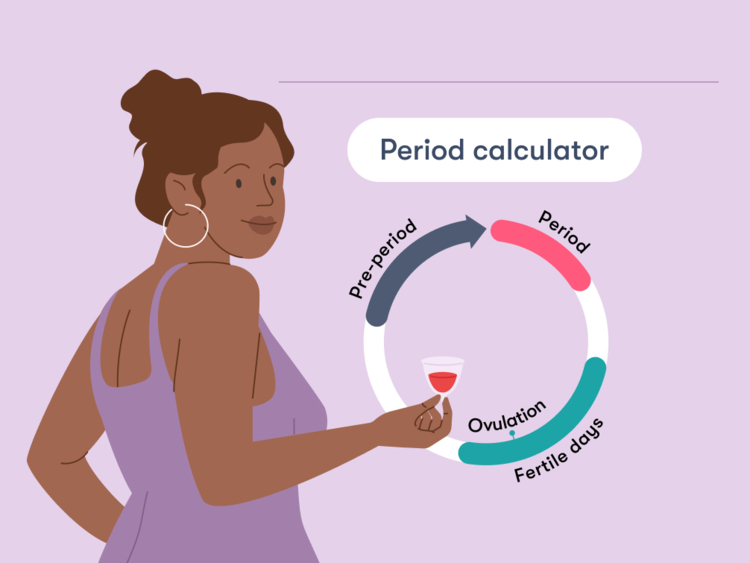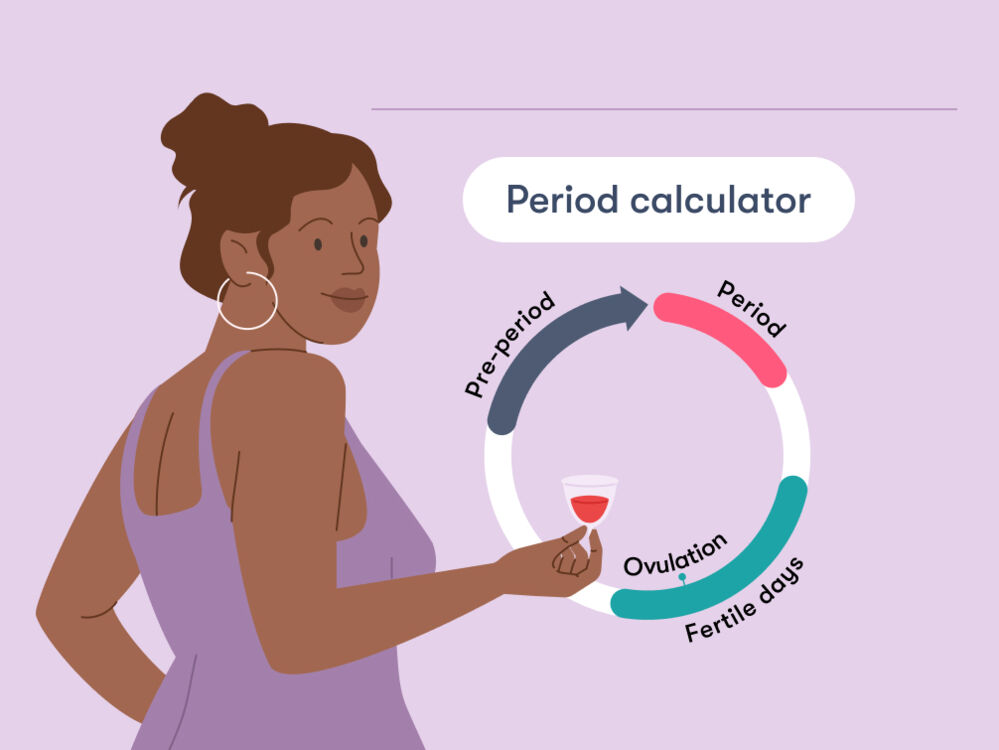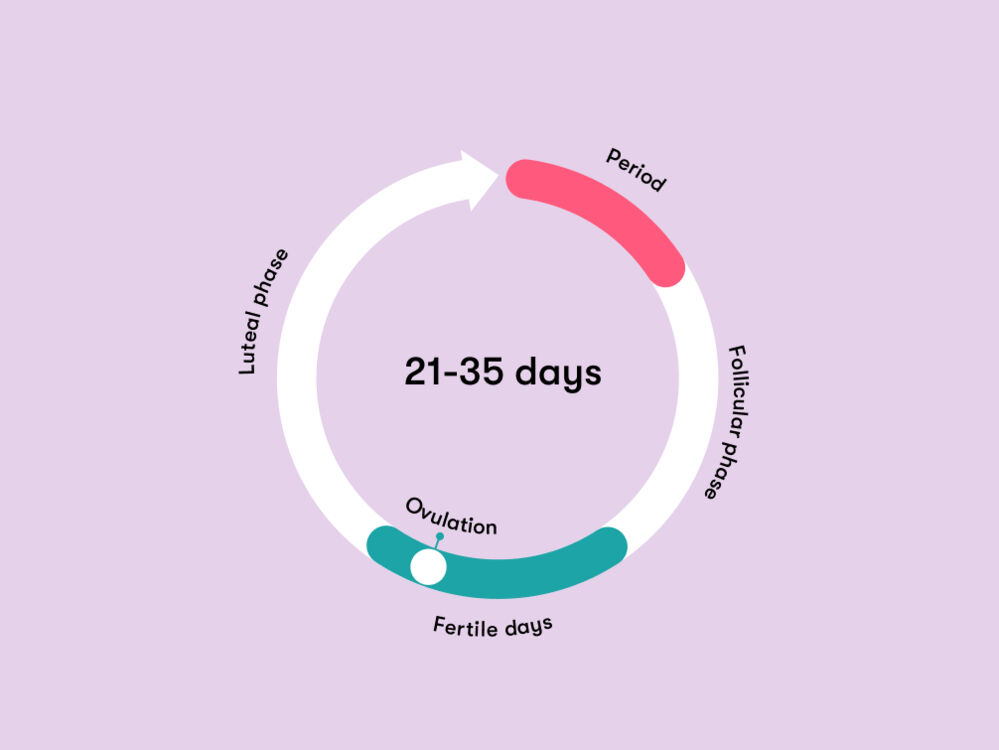-
Your cycle
-
Health 360°
-
Getting pregnant
-
Pregnancy
-
Being a mom
-
LGBTQ+
-
Quizzes
-
Ovulation calculator
-
hCG calculator
-
Pregnancy test calculator
-
Period calculator
-
Implantation calculator
-
Pregnancy calculator
-
Pregnancy due date calculator
-
IVF and FET due date calculator
-
Due date by ultrasound calculator
-
Medical Affairs
-
Science & Research
-
Pass It On Project New
-
Privacy Portal
-
Press Center
-
Careers
-
Contact Us
Period calculator: Predict when your next period will arrive
Being able to predict when your next period will arrive can save you a lot of hassle and help you to understand your own menstrual cycle. Predict your next period now with Flo’s easy-to-use period calculator.



Do you want to know when your next period is likely to start? How about the signs to look out for that show it’s coming?
Understanding more about your menstrual cycle can be invaluable and give you an important insight into your own health. By using some basic information about your last period and your menstrual cycle, Flo’s period calculator can predict when your next period will be, as well as your pre-period and post-period days and ovulation.
Give the period calculator a try (above) and then scroll down for everything you need to know about your menstrual cycle.
Remember that period calculators, period trackers, and period calendars can help you learn more about your menstrual cycle. This tool is based on a regular menstrual cycle. However, menstrual cycles will vary from person to person and month to month, and there are many things that can affect how regular a cycle is, from stress to polycystic ovary syndrome (PCOS). Predictions are estimates, and accurate cycles will vary for each woman and person who menstruates. The results are for informational purposes only and cannot, and should not, be used to prevent pregnancy.
How long is my cycle?
Just like the length of a period, the length of a menstrual cycle will naturally vary from person to person. “A normal menstrual cycle — from day one, which is the first day of bleeding [full bleeding, not spotting], all the way up to the next period — can be anywhere from 21 to 35 days,” explains Dr. Twogood.
If you’re struggling to use a menstrual cycle calendar because your periods are a bit, well, all over the place, don’t panic. It’s not necessarily a cause for concern. Fluctuations in the length of your menstrual cycle are incredibly common. In fact, research shows that between 14% and 25% of women have irregular menstrual cycles. As Dr. Twogood explains, these fluctuations can happen for all kinds of reasons. “Changes in lifestyle, diet, exercise, circadian rhythm, stress, weight gain, or weight loss are all contributors,” she says. “One reason for irregular ovulation is PCOS. Another is perimenopause or even premature ovarian insufficiency.” If you’re experiencing irregular periods, it could be a good idea to get checked by your health care provider.

What are the signs of your period coming?
Your own body can often be a very accurate period predictor, as it will likely give you a number of signals to let you know your next period is on the way, which is pretty handy. These signals are very common. Anywhere between 80% and 90% of women will experience them.
But why do we get these signals? “It’s thought to be due to the normal fluctuations of hormones at the end of the luteal phase [the days between ovulation and your period],” explains Dr. Twogood. “Both progesterone and estrogen drop significantly right before a period starts — that’s what causes a period!”
If these symptoms are distressing or bothersome, then they’re categorized as premenstrual syndrome (PMS), which is also very common. Researchers reckon that around three in every four women have experienced PMS at some point. PMS symptoms will typically arrive in the five days leading up to your next period.
Wondering if you might have PMS? If you’re experiencing some of the symptoms below, and they’re bothersome or interfering with your life, you could be experiencing PMS.
Tender breasts
Have you ever noticed that your breasts feel more tender or even painful in the buildup to your next period? This could be due to PMS. “Progesterone typically peaks about seven days after ovulation,” explains Dr. Twogood. “Progesterone causes changes in the breast tissue, and that causes them to be more full and tender around this time.”
Acne-prone skin
Is there anything more annoying than those pre-period breakouts? If it’s any consolation, one study found that almost two-thirds (63%) of us experience acne flare-ups in the week before our periods, so you can at least take some comfort in knowing that you’re not alone. According to Dr. Twogood, that pesky progesterone is also responsible for wreaking havoc with your skin.
Menstrual cramps
Menstrual cramps are another sure sign that your period could be on the way. While they can undoubtedly be painful and uncomfortable (and we’d like to take a moment here to thank our good friend, the hot water bottle), menstrual cramps do actually serve a purpose. “Menstrual cramps are caused by chemical messengers called prostaglandins that are released when the blood flow to the lining of the uterus is decreased,” explains Dr. Twogood. “The prostaglandins make the uterus contract, and the cervix opens ever so slightly to allow the period blood to come out.”
Mood swings
Mood swings are, unfortunately, another PMS symptom to add to your menstrual cycle calendar. If you find yourself veering from furious one minute to completely calm the next, it could be due to the natural fluctuations in your hormones around this time. However, if you find that these mood swings feel extreme or interfere with your daily life, you might be experiencing a more severe form of PMS, called premenstrual dysphoric disorder. This can feel understandably frightening, but remember that you’re not alone, and there are treatment options available. If you’re concerned, always speak to your health care provider.
Feeling bloated
Bloating in the leadup to your period is super common, and once again, it’s mostly due to those fluctuating hormones. If you’ve been satisfying a craving for salty or sweet foods around this time (chocolate, we’re looking at you), then your body might also be retaining more water than usual. While bloating during this time is really common, if your bloating doesn’t go away even after your period, it could be worth checking in with your health care provider to make sure there’s nothing more serious happening.
Feeling very tired
Do you find yourself feeling sluggish and sleepy right before your period starts? We hear you. Feeling tired to the point of exhaustion just before your period is, unfortunately, yet another common PMS symptom. Research has shown that the levels of serotonin, a brain chemical that impacts your mood, in people with PMS drops in the 10 days before a period, which can have an impact on both your mood and the quality of your sleep. If the impact is severe, it might be worth booking an appointment with your health care provider to discuss this.
Dry discharge
Changes in your vaginal discharge can also be useful to note in your period calendar, as it can vary throughout your menstrual cycle. For example, your cervix will produce an increased amount of cervical mucus around ovulation to help sperm reach your egg. During this time, your discharge is likely to be stretchy and slippery, like raw egg whites. However, the leadup to your period is the least fertile time in your menstrual cycle calendar, meaning you are likely to have no discharge or very dry or sticky discharge during that time.
Why is my period late?
If you’ve used the period calculator, but your period hasn’t arrived as expected, or you’ve missed the date planned on your menstrual cycle calendar, then your period is probably late. This can be understandably distressing, but try not to worry. This isn’t necessarily a cause for concern. “In terms of how many days ‘late’ is considered abnormal depends on the individual,” explains Dr. Twogood. For example, if your period comes like clockwork every 28 days, then it might be considered late if it doesn’t arrive by 30 days. However, if your period is a little more variable and arrives every 28 to 31 days, then a period arriving on day 30 might not be late for you. “If periods are consistently late, irregular, or have no pattern to them, that’s a good reason for an evaluation [with your health care provider],” Dr. Twogood adds.
As we’ve already seen, 14% to 25% of women have irregular menstrual cycles, so you’re certainly not alone if your period arrives late (or early).
Of course, there could be one obvious reason for a late period. If someone has had sex, “then a late period for them could mean a pregnancy and a reason to take a pregnancy test,” Dr. Twogood explains. Again, if your periods are late and irregular, it could be worth checking in with your health care provider.
Period tracking with Flo
As we’ve seen, it can be extremely helpful to use a period calculator to track your menstrual cycle. “It can be very helpful to gather data, especially if someone is concerned about their period,” adds Dr. Twogood. “When patients come to see me in the office for concerns about their period, it is helpful for me to see their period tracking to get a sense of patterns (or lack of) that they may not have noticed themself. It also helps to give data and numbers to a concern instead of saying, ‘It’s all over the place.’ The numbers can show OB-GYNs exactly what ‘all over the place’ means to you!”
So go ahead and get started using the period calculator tool and consider downloading the Flo app to discover more about your periods and your cycle.
Go Premium for more detailed predictions on your period tracker based on personal data.
Please note, if your average cycle is below 21 days or above 35 days, you may not be menstruating regularly and need to speak to a health care provider for more information.
According to ACOG, an average period generally lasts up to seven days. If your period is longer than this, you may need to speak to a health care provider for more information.
Remember, the period calculator tool is not a contraceptive.
References
“Cervical Mucus.” Cleveland Clinic, my.clevelandclinic.org/health/body/21957-cervical-mucus. Accessed 15 Sep. 2022.
Elsaie, Mohamed L. “Hormonal Treatment of Acne Vulgaris: An Update.” Clinical, Cosmetic and Investigational Dermatology, vol. 9, Sep. 2016, pp. 241–48.
Higgins, Erin. “Why Is My Period Lasting So Long?” Cleveland Clinic, 17 May 2019, health.clevelandclinic.org/why-is-my-period-lasting-so-long/.
“Irregular Periods.” NHS, www.nhs.uk/conditions/irregular-periods/. Accessed 15 Sep. 2022.
Lucky, Anne W. “Quantitative Documentation of a Premenstrual Flare of Facial Acne in Adult Women.” Archives of Dermatology, vol. 140, no. 4, Apr. 2004, pp. 423–24.
“Menstrual Cramps.” Mayo Clinic, 30 Apr. 2022, www.mayoclinic.org/diseases-conditions/menstrual-cramps/symptoms-causes/syc-20374938.
“Menstruation in Girls and Adolescents: Using the Menstrual Cycle as a Vital Sign.” The American College of Obstetricians and Gynecologists, www.acog.org/clinical/clinical-guidance/committee-opinion/articles/2015/12/menstruation-in-girls-and-adolescents-using-the-menstrual-cycle-as-a-vital-sign. Accessed 26 Sep. 2022.
“Ovulation Signs: When Is Conception Most Likely?” Mayo Clinic, 7 Dec. 2021, www.mayoclinic.org/healthy-lifestyle/getting-pregnant/expert-answers/ovulation-signs/faq-20058000.
“Perimenopause.” Mayo Clinic, 7 Aug. 2021, www.mayoclinic.org/diseases-conditions/perimenopause/symptoms-causes/syc-20354666.
“Period Pain.” NHS, www.nhs.uk/conditions/period-pain/. Accessed 15 Sep. 2022.
“Periods and Fertility in the Menstrual Cycle.” NHS, 2 Sep. 2022, www.nhs.uk/conditions/periods/fertility-in-the-menstrual-cycle/.
“Polycystic Ovary Syndrome (PCOS).” Mayo Clinic, 8 Sep. 2022, www.mayoclinic.org/diseases-conditions/pcos/symptoms-causes/syc-20353439.
“Premenstrual Syndrome (PMS).” Mayo Clinic, 25 Feb. 2022, www.mayoclinic.org/diseases-conditions/premenstrual-syndrome/symptoms-causes/syc-20376780.
“Premenstrual Syndrome (PMS).” NHS Inform, www.nhsinform.scot/healthy-living/womens-health/girls-and-young-women-puberty-to-around-25/periods-and-menstrual-health/premenstrual-syndrome-pms. Accessed 26 Sep. 2022.
“Premenstrual Syndrome (PMS).” The American College of Obstetricians and Gynecologists, www.acog.org/womens-health/faqs/premenstrual-syndrome. Accessed 15 Sep. 2022.
“Premenstrual Syndrome and Menstrual-Related Disorders.” Clinical Gate, 11 Apr. 2015, clinicalgate.com/premenstrual-syndrome-and-menstrual-related-disorders/.
“Primary Ovarian Insufficiency.” Mayo Clinic, 27 Oct. 2021, www.mayoclinic.org/diseases-conditions/premature-ovarian-failure/symptoms-causes/syc-20354683.
Ramakrishnan, Rathi, et al. “Morphological Changes in Breast Tissue with Menstrual Cycle.” Modern Pathology, vol. 15, no. 12, Dec. 2002, pp. 1348–56.
Rapkin, A. J., et al. “Whole-Blood Serotonin in Premenstrual Syndrome.” Obstetrics and Gynecology, vol. 70, no. 4, Oct. 1987, pp. 533–37.
“Stopped or Missed Periods.” NHS, www.nhs.uk/conditions/stopped-or-missed-periods/. Accessed 15 Sep. 2022.
“The Menstrual Cycle: Menstruation, Ovulation, and How Pregnancy Occurs.” The American College of Obstetricians and Gynecologists, www.acog.org/womens-health/infographics/the-menstrual-cycle. Accessed 15 Sep. 2022.
Vashadze, Sh V. “[Insomnia, Serotonin and Depression].” Georgian Medical News, no. 150, Sep. 2007, pp. 22–24.
“Water Retention: Relieve This Premenstrual Symptom.” Mayo Clinic, 21 Jan. 2022, www.mayoclinic.org/healthy-lifestyle/womens-health/in-depth/water-retention/art-20044983.
“What Are Menstrual Irregularities?” Eunice Kennedy Shriver National Institute of Child Health and Human Development, www.nichd.nih.gov/health/topics/menstruation/conditioninfo/irregularities. Accessed 15 Sep. 2022.